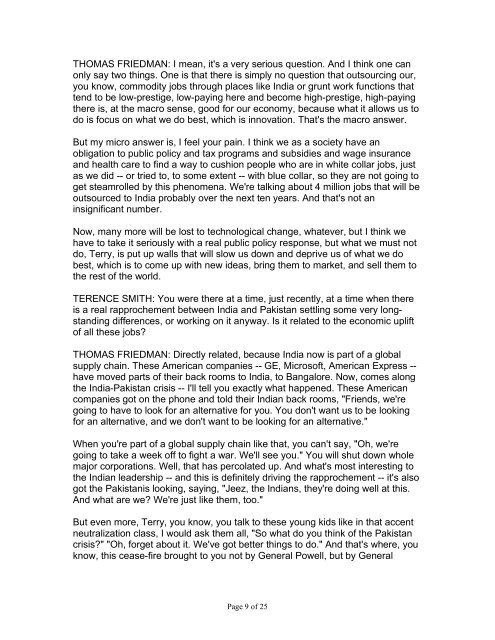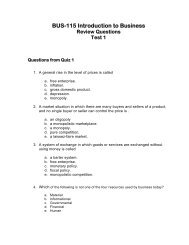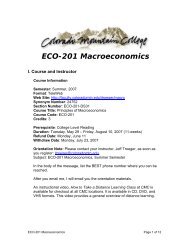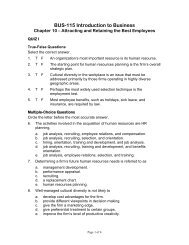Why the World Is Flat
Why the World Is Flat
Why the World Is Flat
You also want an ePaper? Increase the reach of your titles
YUMPU automatically turns print PDFs into web optimized ePapers that Google loves.
THOMAS FRIEDMAN: I mean, it's a very serious question. And I think one can<br />
only say two things. One is that <strong>the</strong>re is simply no question that outsourcing our,<br />
you know, commodity jobs through places like India or grunt work functions that<br />
tend to be low-prestige, low-paying here and become high-prestige, high-paying<br />
<strong>the</strong>re is, at <strong>the</strong> macro sense, good for our economy, because what it allows us to<br />
do is focus on what we do best, which is innovation. That's <strong>the</strong> macro answer.<br />
But my micro answer is, I feel your pain. I think we as a society have an<br />
obligation to public policy and tax programs and subsidies and wage insurance<br />
and health care to find a way to cushion people who are in white collar jobs, just<br />
as we did -- or tried to, to some extent -- with blue collar, so <strong>the</strong>y are not going to<br />
get steamrolled by this phenomena. We're talking about 4 million jobs that will be<br />
outsourced to India probably over <strong>the</strong> next ten years. And that's not an<br />
insignificant number.<br />
Now, many more will be lost to technological change, whatever, but I think we<br />
have to take it seriously with a real public policy response, but what we must not<br />
do, Terry, is put up walls that will slow us down and deprive us of what we do<br />
best, which is to come up with new ideas, bring <strong>the</strong>m to market, and sell <strong>the</strong>m to<br />
<strong>the</strong> rest of <strong>the</strong> world.<br />
TERENCE SMITH: You were <strong>the</strong>re at a time, just recently, at a time when <strong>the</strong>re<br />
is a real rapprochement between India and Pakistan settling some very longstanding<br />
differences, or working on it anyway. <strong>Is</strong> it related to <strong>the</strong> economic uplift<br />
of all <strong>the</strong>se jobs?<br />
THOMAS FRIEDMAN: Directly related, because India now is part of a global<br />
supply chain. These American companies -- GE, Microsoft, American Express --<br />
have moved parts of <strong>the</strong>ir back rooms to India, to Bangalore. Now, comes along<br />
<strong>the</strong> India-Pakistan crisis -- I'll tell you exactly what happened. These American<br />
companies got on <strong>the</strong> phone and told <strong>the</strong>ir Indian back rooms, "Friends, we're<br />
going to have to look for an alternative for you. You don't want us to be looking<br />
for an alternative, and we don't want to be looking for an alternative."<br />
When you're part of a global supply chain like that, you can't say, "Oh, we're<br />
going to take a week off to fight a war. We'll see you." You will shut down whole<br />
major corporations. Well, that has percolated up. And what's most interesting to<br />
<strong>the</strong> Indian leadership -- and this is definitely driving <strong>the</strong> rapprochement -- it's also<br />
got <strong>the</strong> Pakistanis looking, saying, "Jeez, <strong>the</strong> Indians, <strong>the</strong>y're doing well at this.<br />
And what are we? We're just like <strong>the</strong>m, too."<br />
But even more, Terry, you know, you talk to <strong>the</strong>se young kids like in that accent<br />
neutralization class, I would ask <strong>the</strong>m all, "So what do you think of <strong>the</strong> Pakistan<br />
crisis?" "Oh, forget about it. We've got better things to do." And that's where, you<br />
know, this cease-fire brought to you not by General Powell, but by General<br />
Page 9 of 25









